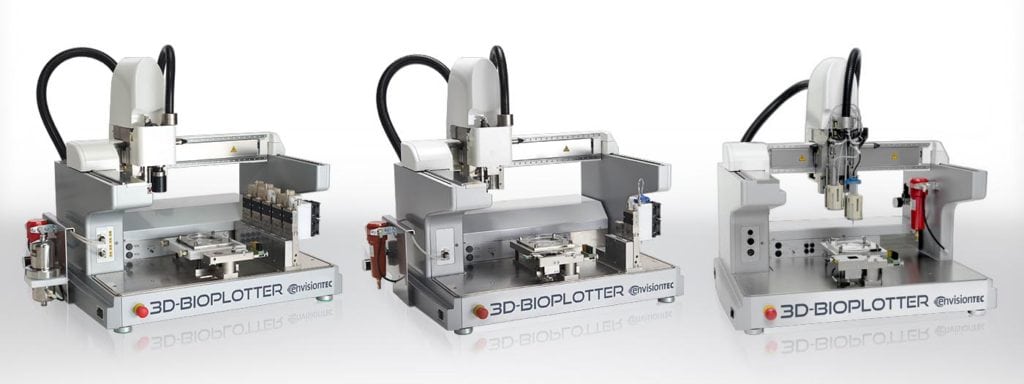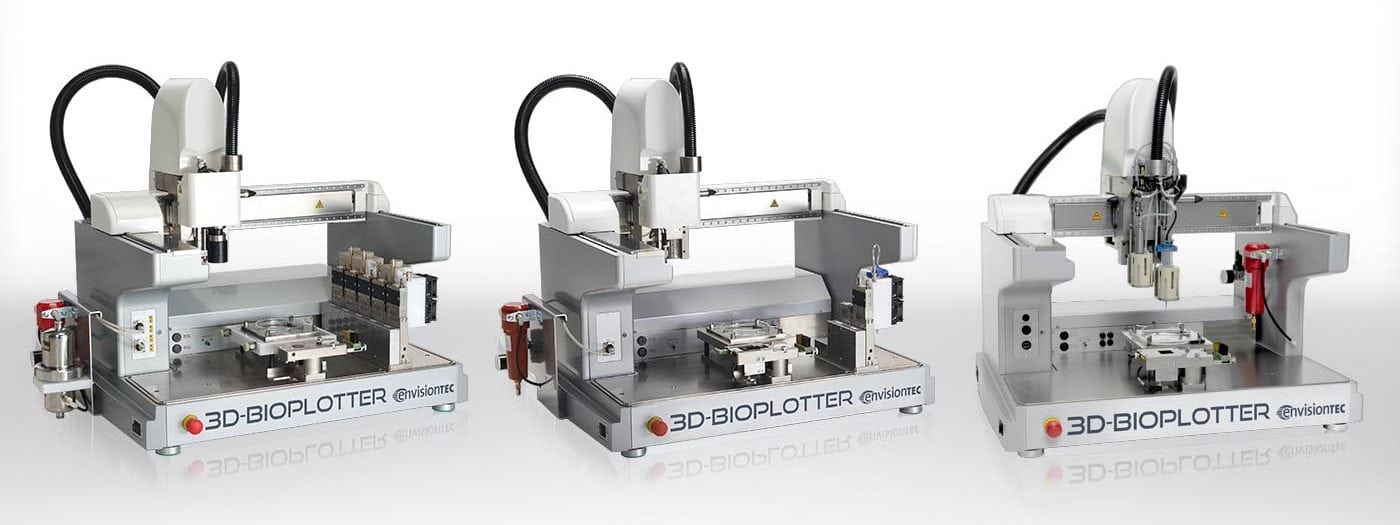
Peer-Reviewed Journals Have Published More than 200 Research Papers Featuring the EnvisionTEC 3D-Bioplotter
DEARBORN, Mich., July 31, 2017 — The EnvisionTEC 3D-Bioplotter® has further secured its position as the most researched bioprinter in the world, with more than 200 scientific, technical and medical research papers now published in peer-reviewed journals.
EnvisionTEC, a leading global manufacturer of desktop and full-production 3D printers and materials, now offers three versions of the 3D-Bioplotter — a Starter, Developer and Manufacturer series — to accommodate demand for different capabilities.
In 2016, EnvisionTEC launched an online database to track the growing amount of research being done with its bioprinter at universities, colleges, hospitals and companies worldwide.
“The diversity and depth of these papers demonstrate the advanced research our customers can perform with our premium technology,” said Carlos Carvalho, who led EnvisionTEC’s development of the fourth generation of the 3D-Bioplotter and has worked on the bioprinter since its infancy at the University of Freiburg in Germany.
A variety of topics are covered in the 3D printing research database, viewable at www.envisiontec.ciwebstudio.com/bioprinter, such as:
- regeneration of bone, cartilage, soft tissue, nerves, tendon and teeth
- organ printing, including a bioprosthetic mouse ovary successfully implanted in-vivo resulting in a live birth
- direct cell printing
- trachea reconstruction
- spinal cord injuries
- drug release, such as gene therapy or treatment for epilepsy or tuberculosis
- particle-based inks which are mixtures of polymers, ceramics and metals
One of the most recent additions to the research database explores repairing tympanic membrane perforations (TMPs) with customized, bioprinted ear grafts. Another paper examines how to X-ray or visualize healing cardiac patches made of 3D printed alginate hydrogels for heart attack or myocardial infarction repair after implantation.
While much of the research with the 3D-Bioplotter has been done in-vitro, or outside of a living organism, there is a growing body of in-vivo work in small and large animals. As the pace of 3D printing research continues to mature, EnvisionTEC expects work to be published involving live human subjects in the period ahead.
The 3D-Bioplotter is also being used to do research outside of traditional medicine, with food, extraterrestrial building materials and more. For example, research into 3D printed electrical conductive materials has been done involving sensors and soft robotics. Researchers are also printing particle-based inks, which can be mixtures of polymers, ceramics and metals, to build objects for baking or sintering in a post-processing phase to create fully dense metal parts. This type of process could eventually be used to make a variety of objects better, including batteries and fuel cells.
The first generation of the 3D-Bioplotter, developed in concert with the University of Freiburg in Germany, is now in its fourth generation. With more than 15 years of hardware and software development, the 3D-Bioplotter is an easy-to-use modular machine with advanced features and capabilities. The robust machine processes open-source biomaterials using air or mechanical pressure to a multitude of syringes that can fabricate scaffolds to create tissue, organs and more. The 3D-Bioplotter system offers easily configurable complex inner pattern designs, and it has been designed for use in a sterile biosafety cabinet that meets standards for clinical trials.
About EnvisionTEC
EnvisionTEC is a leading global provider of professional-grade 3D printing solutions. Founded in 2002 with its pioneering commercial DLP printing technology, EnvisionTEC now sells more than 40 printer configurations based on six distinct technologies that build objects from digital design files. The company’s premium 3D printers serve a variety of medical, professional and industrial markets, and are valued for precision, surface quality, functionality and speed. EnvisionTEC’s intellectual property includes more than 140 pending and granted patents and 170 materials.
Dipl. Chem. Carlos Carvalho, Process & Material Development, EnvisionTEC
HI-RES PHOTOS
Available for Download, click image below
MEDIA CONTACT
Sarah A. Webster
swebster@envisiontec.ciwebstudio.com
313.888.4460





